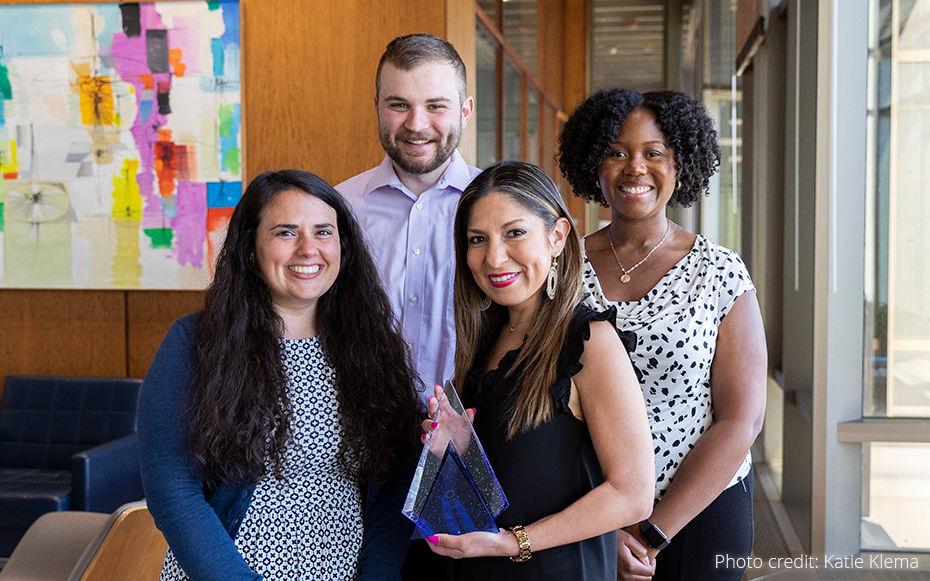In response to the dynamic demands of the contemporary job market, the University of Illinois Chicago, College of Liberal Arts and Sciences Career Development Office designed an innovative eight-week, one-credit career strengths-based course for its students.
“After a few years in my role, I noticed a significant gap in career and major exploration participation, particularly among students who could benefit the most from these resources,” says Elizabeth Herrera, director of career development, University of Illinois Chicago – College of Liberal Arts and Sciences.
“Many LAS students struggle with the misconception that their major directly dictates their career path. Bridging this gap is crucial to help students embrace the diverse potential their education offers.”
NACE AWARD WINNER
The University of Illinois Chicago, College of Liberal Arts and Sciences Career Development Office, winner of the 2024 NACE Career Readiness Excellence Award, designed an innovative eight-week, one-credit career strengths-based course for its students. For more information about the NACE Awards program, see www.naceweb.org/about-us/nace-awards/.Herrera says that based on conversations and post-appointment surveys, the primary barriers LAS students face include a lack of awareness and time constraints preventing them from fully using career services. To address this, she proposed the course to the college that integrates NACE Career Readiness Competencies, Designing Your Life, and CliftonStrengths.
“By structuring the curriculum around these competencies and methodologies, we aim to provide students with a holistic understanding of the skills and attributes essential for success in their future careers,” she explains.
“The CliftonStrengths assessment, renowned for fostering self-awareness and empowerment, plays a pivotal role. Gallup's research indicates that students equipped with a clear understanding of their innate talents are more likely to excel academically and in their future careers. This course strategically incorporates the CliftonStrengths assessment to aid students in identifying and cultivating their unique strengths.”
Herrera adds that the "Designing Your Life" framework emphasizes the recognition of multiple “good” paths and embraces the continuous and ever-evolving nature of the career design process.
“This approach encourages adaptability, curiosity, and a willingness to explore different avenues, crucial for liberal arts and sciences students navigating diverse career paths,” she says.
“As students reflect on their innate strengths and gain a sense of control over their unique paths, the course emphasizes the importance of being career-ready according to NACE's competencies.”
Herrera says the goals of the career success course are to help students:
- Integrate design thinking, self-reflection, and strengths-based approaches into career and self-development practices;
- Confidently navigate the career exploration process through online resources, networking, skills building, experiential activities, and conducting informational interviews (curiosity conversations);
- Develop effective internship and job search skills using LinkedIn, UIC Handshake, and other online databases;
- Build a professional and marketable brand by creating a solid resume, composing effective cover letters, refining interviewing skills, and navigating LinkedIn;
- Implement networking strategies to build intentional and meaningful connections with alumni, faculty, UIC campus resources, and employers to enhance social capital and learn about career paths;
- Gain an understanding of how to build upon career readiness competencies as measured by NACE; and
- Recognize the importance of emotional intelligence and professionalism in building a successful career.
Recognizing the demands on students’ time, the career success course offers advanced elective credit, incentivizing participation and emphasizing the practical relevance of career development.
“This approach aligns with academic goals and maximizes the impact of our limited staffing resources, allowing us to reach more students effectively,” Herrera says.
In Spring 2022, the college approved a pilot for one section of the course. Due to the success of the course as well as the expansion of the career development team, the office was able to offer six sections of the course by Spring 2024. The career success course is open to sophomores, juniors, and seniors.
Throughout the eight-week curriculum, students navigate the process of career exploration, making informed decisions about their future based on individual interests, values, and strengths. They learn:
- How to leverage LinkedIn as a versatile tool for networking;
- Skills building;
- Mock interviewing;
- Career exploration; and
- Job searching.
In addition, students are required to:
- Conduct an informational interview;
- Attend a networking event;
- Complete a certification through LinkedIn learning; and
- Create a final video that captures their strengths, personal brand, career readiness. and next steps.
Herrera says the career development team is currently working on elevating the course modules to make the activities more engaging and incorporate more of the design thinking process in its group discussions, self-reflections, and in-class activities. It is also incorporating the use of AI for some of the modules.
In evaluating the course against the learning objectives, the University of Illinois Chicago – College of Liberal Arts and Sciences Career Development team measures students' confidence levels related to career readiness and professional development.
The approach involves designing pre and post surveys using a Likert Scale. The survey questions focus on key aspects such as understanding interests, strengths, and values, and the ability to articulate a personal brand. Additionally, it assesses competencies in:
- Resume optimization;
- LinkedIn use;
- Readiness for informational interviews and networking;
- Effective communication in interviews;
- Recognition of the positive impact of ongoing professional development; and
- Overall preparedness to design a unique career path.
“The data collected has revealed significant increases in students’ confidence levels across these crucial career readiness competencies,” Herrera points out.
“This showcases the program’s effectiveness in achieving its objectives. It is evident from the responses that students demonstrated enhanced self-awareness, communication skills, and preparedness for various aspects of their professional journey.”
She says she has learned a host of lessons throughout the process of developing, implementing, and maintaining the course, including those addressing:
- Continuously improving through team feedback—Through ongoing conversations with her team members who also teach the course, the group has learned the importance of continuously updating and modifying the curriculum based on the feedback it receives each semester. This iterative process ensures the course remains relevant and effective.
- Enhancing student engagement—The career development team is always looking for ways to make the course more engaging. By incorporating interactive elements and varied teaching methods, it aims to keep students actively involved and invested in their learning journey.
- Appealing to upperclassmen—The team has learned that the course being credit-bearing appeals most to upperclassmen. Understanding this demographic has helped it tailor the content and delivery to better meet their needs and expectations.
- Forming strategic partnerships for promotion—Partnering with the academic advising department has been crucial in promoting the course. Its support has helped career development reach more students and ensure they are aware of this course.
- Targeting the marketing—In addition to working with academic advisers, the career development team also focused on marketing the course to its affinity offices and student success centers. This targeted approach helps career development reach students who need this type of support the most, ensuring they benefit from the resources and guidance the course offers.
Herrera offers the following suggestions to her career services colleagues who are looking to develop a career success course similar to that developed by the University of Illinois Chicago – College of Liberal Arts and Sciences Career Development team:
- Begin by having a clear vision for your course. This will guide your development process and help you articulate the benefits when pitching the idea to administration.
- Implement assessments to measure the outcomes of your course. This data is invaluable for demonstrating the course’s effectiveness and making a case for its expansion or continuation.
- Initially, students may not gravitate toward this type of course, but earning advanced elective credits can provide an incentive that can significantly boost enrollment.
- Work closely with colleagues who are student-facing, such as academic advisers, affinity offices, and student success centers to promote the course and expand outreach to students who may not necessarily access career services.
- Designing and implementing a course like this requires patience and persistence. Expect challenges along the way and be prepared to adapt as needed.
- Stay committed to your vision and the positive impact it can have on students’ career readiness. It is worth it and very rewarding!
“Students learn what it truly means to be career ready as measured by NACE and uncover strategies to enhance these competencies for lasting success, all while recognizing the unique value of a liberal arts and sciences degree,” Herrera says.







